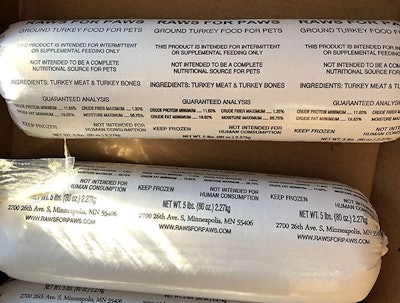
As of July 11, the Centers for Disease Control has received reports of 90 people infected with a genetically related strain of Salmonella Reading from 26 states. Of 61 ill people interviewed by CDC, two children became sick after pets in their home ate raw ground turkey pet food from Raw for Paws. The children became ill in January, according to the Minnesota Department of Health. One child’s infection resulted in osteomyelitis, a painful and serious bone infection.
In that case, Raws for Paws of Minneapolis, Minnesota, USA recalled approximately 4,000 pounds of its 5-pound and 1-pound chubs of ground turkey pet food because the raw pet food was potentially contaminated with Salmonella, according to the United States Food and Drug Administration. The recalled ground turkey pet food was distributed throughout Minnesota, Wisconsin and Iowa directly to consumers and through online mail orders.
The contaminated raw turkey pet food was produced on Oct. 12, 2017.
More information on Salmonella outbreak
Illnesses in the widespread Salmonella outbreak started on dates from November 20, 2017, to June 29, 2018. CDC and public health and regulatory officials in several states are investigating a multistate outbreak of Salmonella Reading infections linked to raw turkey products. The U.S. Department of Agriculture’s Food Safety Inspection Service (USDA-FSIS) is monitoring the outbreak.
A list of the states and the number of cases in each can be found on CDC’s Map of Reported Cases page. A single, common supplier of raw turkey products or of live turkeys has not been identified.
Ill people range in age from less than 1 year to 91, with a median age of 41. Sixty-one percent are female. Of 78 people with information available, 40 (51%) have been hospitalized. No deaths have been reported.
Investigation of the Salmonella outbreak
Public health investigators are using the PulseNet system to identify illnesses that may be part of this outbreak. PulseNet is the national subtyping network of public health and food regulatory agency laboratories coordinated by CDC. DNA fingerprinting is performed on Salmonella bacteria isolated from ill people by using techniques called pulsed-field gel electrophoresis (PFGE) and whole genome sequencing (WGS). CDC PulseNet manages a national database of these DNA fingerprints to identify possible outbreaks. WGS gives a more detailed DNA fingerprint than PFGE. WGS performed on Salmonella from ill people in this outbreak showed that they are closely related genetically. This means that the ill people are more likely to share a common source of infection.
In interviews, ill people answered questions about the foods they ate and other exposures in the week before they became ill. Of 61 people interviewed, 37 (61%) people interviewed reported preparing or eating turkey products that were purchased raw, including ground turkey, turkey pieces, and whole turkey. Ill people reported buying many different brands of raw turkey products from multiple stores. Three of the 61 ill people interviewed worked in a facility that raises or processes turkeys, or lived with someone who did.
The outbreak strain of Salmonella Reading has been identified in samples from raw turkey pet food in Minnesota, from raw turkey products from 19 slaughter and 6 processing establishments, and from live turkeys from several states. The samples collected by FSIS at these slaughter and processing establishments were part of FSIS’ routine testing under the Salmonella performance standards. Furthermore, WGS showed that the Salmonella strain from these samples is closely related genetically to the Salmonella strain from ill people. This result provides more evidence that people in this outbreak got sick from preparing raw turkey products.
WGS analysis did not identify predicted antibiotic resistance in 68 isolates from 28 ill people and 40 food and animal samples. However, 33 isolates from ill people and 49 isolates from food and animal samples contained genes for resistance to all or some of the following antibiotics: ampicillin, streptomycin, sulfamethoxazole, tetracycline, gentamicin, and kanamycin. Testing of four outbreak isolates using standard antibiotic susceptibility testing by CDC’s National Antimicrobial Resistance Monitoring System (NARMS) laboratory confirmed these results. This resistance likely will not affect the choice of antibiotic used to treat most people since these antibiotics are not normally used to treat Salmonella infections.
Available data indicate that this strain of Salmonella Reading may be present in live turkeys and in raw turkey products. CDC and USDA-FSIS shared the results of the investigation with representatives from the turkey industry to make them aware of the outbreak and resulting illnesses, and to ask them about steps they may be taking to reduce Salmonella contamination. Because investigation results suggest this strain of Salmonella Reading is present in both live turkeys and in raw turkey products, further investigation and interventions to reduce the prevalence of this strain should target both the live turkey industry and turkey processing facilities.

















